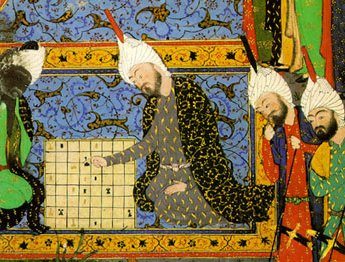
“The worst enemy of the strategist is the clock. Time trouble … Reduces us all too pure reflex and reaction, tactical play. Emotion and instinct cloud our strategic vision when there is no time for proper evaluation.”
The History of Family Business
The histories of Family Businesses span time. There were family farms before there was Rome. Shepherding has been a family business over 6000 years; other Family business are recorded in the Guinness Book of Records, Hoshi Ryokan , a family owned and operated hotel in Japan, opened in 717. Fonderia Pontificia Marinelli, is a bell foundry was founded by the Marinelli family in Argonne, Italy in 1000. Each of these firms has a strategy and tactics to execute their plan.
The History of Chess
 The history of chess spans some 1500 years. The earliest predecessor of the game probably originated in India, before the 6th century AD. From India, the game spread to Persia. When the Arabs conquered Persia, chess was taken up by the Muslim world and subsequently spread to Southern Europe. Chess strategy is the aspect of chess playing concerned with evaluation of chess positions and setting of goals and long-term plans for future play. Tactics are usually contrasted with strategy, in which advantages take longer to be realized, and the opponent is less constrained in responding. The fundamental building blocks of tactics are move sequences in which the opponent is unable to respond to all threats, so the first player realizes an advantage.
The history of chess spans some 1500 years. The earliest predecessor of the game probably originated in India, before the 6th century AD. From India, the game spread to Persia. When the Arabs conquered Persia, chess was taken up by the Muslim world and subsequently spread to Southern Europe. Chess strategy is the aspect of chess playing concerned with evaluation of chess positions and setting of goals and long-term plans for future play. Tactics are usually contrasted with strategy, in which advantages take longer to be realized, and the opponent is less constrained in responding. The fundamental building blocks of tactics are move sequences in which the opponent is unable to respond to all threats, so the first player realizes an advantage.
Chess is about conflict. Strategy is the what. Tactics is the how.
Competing Interests In Family Business
In every business there are competing interests for money and control. The leading generation of a family business may, for example, want to sell the business to the succeeding generation for the maximum amount while the succeeding generation wants to purchase the business for the minimum amount. Another common example of inherent conflict would be the competing interests between those owners in the succeeding generation who are active in the business and want to reinvest profits to grow the business while owners in the succeeding generation who are not active in the business want the profits distributed to owners. These inherent business conflicts are not in themselves dysfunctional. Typical inherent conflicts in family businesses include the following:
- Ownership distribution
- Management roles and succession
- Employment qualifications
- Compensation
- Family behavior and commitment
- Governance
- Distribution of profits
- Liquidity needs vs. capital demands
- Reinvestment
- Retirement
- Estate planning.
Most people believe that “good families” don’t require any special attention or cultivation… Families who are in business together can use some of the following “tools” to strengthen their family. These tools include family meetings, maybe a family mission statement, a code of conduct and some classes on communication.
Chess is about conflict, the Family Business Institute reports that over 20% of family businesses have weekly conflicts. Managing the strategy and tactics are keys. “The worst enemy of the strategist is the clock. Time trouble … Reduces us all too pure reflex and reaction, tactical play. Emotion and instinct cloud our strategic vision when there is no time for proper evaluation. “

Leave a Reply